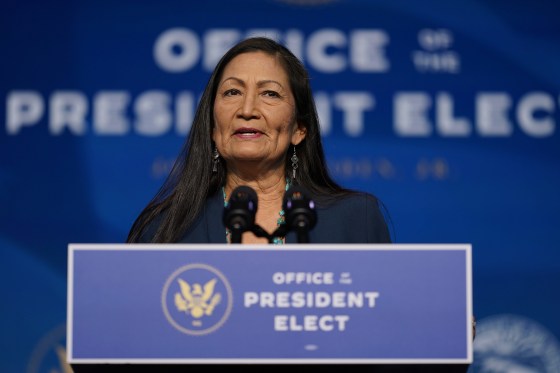WASHINGTON — Interior Secretary nominee Deb Haaland stressed at her Senate confirmation hearing Tuesday that she supports energy independence even as one lawmaker described her nomination as a “proxy fight” over the future of fossil fuels.
In testimony before the Senate Energy and Natural Resources Committee, Haaland said in her opening statement that she’s committed to striking “the right balance” if confirmed as interior secretary as the department faces support for the use of oil and natural gas while trying to tackle climate change and conserve public lands.
Committee Chairman Sen. Joe Manchin, D-W.Va., who is up for re-election next year, asked whether Haaland supports energy independence and what role fossil fuels might play in that effort.
“We absolutely need energy independence and I believe President Biden agrees with that statement as well. I know that we want to move forward with some clean energy, we want to get to net-zero,” Haaland said.
Haaland, who has represented New Mexico’s 1st Congressional District in the House since 2019, said that the move to energy independence is “not going to happen overnight.”
“We will absolutely rely on the fossil [fuel] energy,” she said. “But at the same time, I think we can move forward with the technology and innovation as well.”
Haaland faces opposition from many Republicans and potentially some Democrats. Manchin, for example, is undecided on whether to support her nomination, his spokeswoman Sam Runyon told NBC News on Monday.
Support from Manchin is critical as Democrats can’t lose any of its members to ensure confirmation of President Joe Biden’s nominees. In addition, at least two Republicans on that committee, Sens. John Barrasso of Wyoming and Steve Daines of Montana, have expressed strong reservations about Haaland.
Barrasso, the panel's ranking member, told Haaland Tuesday that he is “troubled” by many of her views and questioned why she tweeted last October that Republicans don’t believe in science. He said that he and several other committee members are doctors and asked whether she thinks they believe in science.
“If you're a doctor, I would assume that you believe in science,” she said.
Daines said Tuesday that he’s also “concerned” with her nomination, saying that he thinks her leadership would “harm Montana’s economy.” He asked Haaland why she supported a bill to protect grizzly bears in Yellowstone National Park even though the population allowed for the lifting of their endangered species categorization.
"I believe at the time, I was caring about the bears," she said.
Biden's agenda, including the possible creation of a Civilian Climate Corps, “demonstrates that America’s public lands can and should be engines for clean energy production" and “has the potential to spur job creation," Haaland said in her testimony Tuesday.
Haaland rebuffed criticism from some Republicans who have complained that her opposition to drilling on federal lands will cost thousands of jobs and harm economies throughout the West.
Haaland, 60, would be the first Native American to lead a Cabinet agency. The Laguna Pueblo member and two-term congresswoman often draws on her experience as a single mother and the teachings of her ancestors as a reminder that action the U.S. takes on climate change, the environment and sacred sites will affect generations to come.
Native Americans see Haaland’s nomination as the best chance to move from consultation on tribal issues to consent and to put more land into the hands of tribal nations either outright or through stewardship agreements. The Interior Department has broad oversight of tribal affairs and energy development.
“The historic nature of my confirmation is not lost on me, but I will say that it is not about me,'' Haaland said. “Rather, I hope this nomination would be an inspiration for Americans — moving forward together as one nation and creating opportunities for all of us.''
She promised to listen to and work with members of Congress on both sides of the aisle and ensure that the Interior Department's decisions are based on science. She also vowed to “honor the sovereignty of tribal nations and recognize their part in America’s story.''
She said she fully understands the role the Interior Department must play in Biden's “build back better” plan for infrastructure and clean energy and said she will seek to protect natural resources for future generations “so that we can continue to work, live, hunt, fish, and pray among them.''
Haaland's nomination has stirred strong opposition from some Republicans who say her “radical ideas” don’t fit in with a rural way of life, particularly in the West. They cite her support for the Green New Deal and Biden’s recent moratorium on oil and gas drilling on federal lands — which doesn’t apply to tribal lands — and her opposition to fracking and the Keystone XL oil pipeline.
National civil rights groups have joined forces with tribal leaders and environmental groups in supporting Haaland. A joint statement by the NAACP, UnidosUS and Asian & Pacific Islander American Health Forum praised her nomination as “historic” and called Haaland “a proven civil rights/racial justice advocate.”
A letter signed by nearly 500 national and regional organizations representing Native Americans, environmental justice groups and outdoor businesses called Haaland “a proven leader and the right person to lead the charge against the existential threats of our time: tackling the climate, biodiversity, extinction and COVID-19 crises and racial justice inequities on our federal public lands and waters.”


